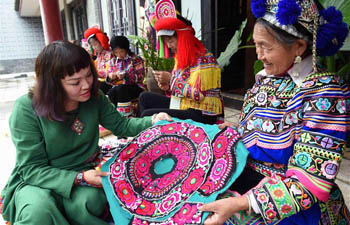ACCRA, July 18 (Xinhua) -- Ghana urged leaders of the African continent here late Monday to make the creation of comprehensive policies that guide access, utilization and management of land a priority.
This, it said is necessary to deal with the complex land administration issues that hinder the development on the continent.
Opening the African Lands Commission Conference and the African Regional Gender Workshop here, Deputy Minister for Lands and Natural Resources, Benito Owusu Bio lamented that production levels in Africa were abysmally low in spite of abundant arable lands.
"While we have the most suitable lands for agriculture, our productivity gap turns to be the highest. We see land ownership inequalities and landlessness growing in several African countries. Women as majority primary producers are constrained by customary laws," the minister said.
He continued that arable lands, forests and wetlands are being degraded at an alarming rate while there is a high rise in urban slums that undermines urban development and poverty reduction efforts.
The official however lauded the recognition given to this situation by the heads of state and governments of the continent with a firm declaration by the African Union (AU) on land issues enjoining all countries to take steps to recognize the centrality of land to sustainable economic growth, development and security of the social, economic and cultural livelihoods of their peoples.
In dealing with these issues, Bio said Ghana has since 1999 embarked on reforms on land administration.
He said the project which is in the second phase recognizes the fundamental role of Customary Land administration in the country.
"Estimated close to 80 percent of land ownership is held in Customary Tenure; any reform measure that does not take this fundamental fact into account is doomed for failure," he cautioned.
Bio therefore urged the participants to arrive at concrete steps that are needed to make land tenure in Africa an enabler of development.
The workshop, which is part of the AU Agenda on land being implemented by the Land Policy Initiative (LPI) seeks to facilitate cross-country learning and information-sharing about the results and experiences in different countries among key actors within land commissions on challenges and opportunities to secure the land rights of local communities, women, and Indigenous Peoples through statutory recognition of customary (collective) land tenure and its subsequent operationalization.
Customary land regimes are not uniform but vary from community to community. Lessons across Africa suggest that the integration of customary land regimes into formal land governance systems is equally not uniform, observed Janet Edeme, Head of Rural Division, Department of Rural Economy and Agriculture, African Union Commission.
These functional characteristics, she added, largely explain why customary land tenure is viewed as a tenure regime that is not static, but continually evolving in response to multiple factors including, urbanization and demographic change, monetization of economies, increasing integration with the global economy, political processes and cultural change.
Beyond the core issues confronting community land governance, Edeme noted that evidence available at the LPI also points to serious capacity needs even among the land administration agencies at governmental level abound.

















